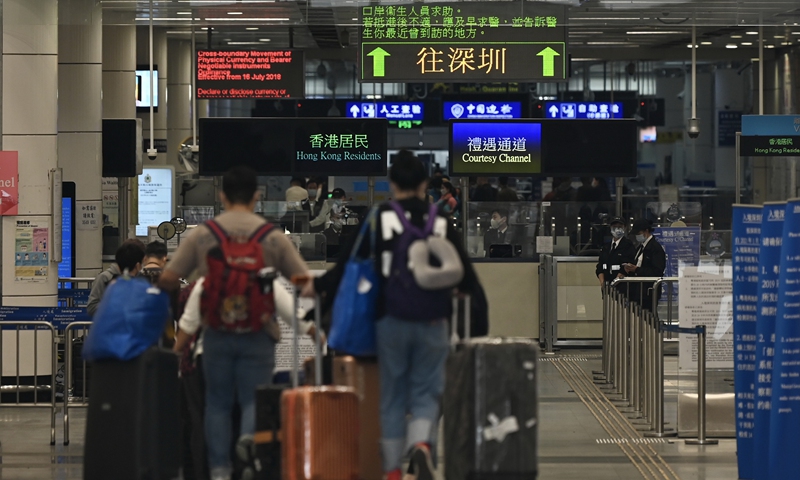HK ports prepare for normal operations with official confirming border reopening is in sight

A file photo shows that travelers pass through a land port connecting Hong Kong and Shenzhen, South China's Guangdong Province. Photo: IC
While the border reopening between the Chinese mainland and Hong Kong topped the agenda of the annual report delivered by John Lee, Chief Executive of the Hong Kong Special Administrative Region (HKSAR) government, local media have reported that some ports have already begun preparing for normal operations, and a senior official confirmed with Global Times that the border resumption is in sight.
Lee, who left for Beijing for his first official visit on Wednesday and is scheduled to return to Hong Kong on Saturday, mentioned earlier that he would raise the matter of border resumption between the mainland and Hong Kong with senior Chinese leaders.
At the West Kowloon high-speed railway station, which has been suspended since early 2020 due to the outbreak of COVID, there have been security and maintenance staff as well as cleaning staff reporting for work in recent days, and the Mass Transit Railway - major public transport network operator - also sent out notifications to local merchants at the port of Lok Ma Chau Station to prepare for a port operation inspection from January 3 to 6, local media outlet Wei Wen Po reported on Thursday.
The Global Times noticed that information for a direct train between Beijing and Hong Kong appeared on China's national online train ticket booking platform 12306 on Wednesday but no tickets were available, with passenger services at West Kowloon Station yet to resume.
Tam Yiu-chung, a member of the NPC Standing Committee from Hong Kong, told the Global Times on Thursday that the border reopening between the mainland and Hong Kong is believed to be in sight, and called for authorities to be ready to avoid reopening chaos.
As the mainland adjusts its COVID control policy and scraps many of its previous restrictive measures, calls from residents of both sides of the border for more convenient travel between Hong Kong and the mainland have been growing.
Hong Kong Satellite Television reported on Wednesday that starting from January 3, 2023, China will no longer redirect inbound travelers to quarantine facilities. And the current quarantine policy will be optimized to only three days of home quarantine.
China will further optimize and facilitate the cross-border travels in accordance to the epidemic situation, said Mao Ning, a spokesperson of the Chinese Foreign Ministry, at a routine press conference on Thursday.
Lee recently pointed out that it is possible that Hong Kong and the mainland will realize quarantine-free travel next year.
After the mainland recently unveiled a new 10-point plan to optimize its COVID-19 response, the HKSAR government has been in discussions with Shenzhen and South China's Guangdong Province on the matter of resumption of travel, according to media reports.
Thousands of customs, immigration and police officers will be sent to checkpoints to manage a predicted surge in traffic as the border between Hong Kong and the mainland is expected to fully reopen next month, according to media reports.
Staff used to work at Lo Wu, Lok Ma Chau Station and West Kowloon Station who have been transferred to other stations due to the suspension of port operations were recently recalled to their posts, Wei Wen Po said, further hinting that normal operations may not be far away.
Any easing of restrictions along the border with the mainland should be done gradually to prevent a wave of COVID-19 infections, the South China Morning Post said on Thursday, citing health experts and politicians.
Government health adviser Professor David Hui Shu-cheong on Wednesday suggested implementing a triple-jab requirement for all inbound travelers and a daily quota for those coming from the mainland to reduce the risk of infections and safeguarding the public healthcare system, the SCMP said.


